GARDENA – Quality control during assembly
In manufacturing, delicate components often need to be checked before the next processing step. GARDENA, a renowned manufacturer of gardening tools, relies on powerful vision sensors from ifm.
GARDENA is the leading German brand for irrigation products, mechanical cutting tools and classical gardening tools. At its plant in Niederstotzingen near Ulm, Gardena produces manual shears, loppers and grass shears. Production Manager Jens Starke: “Our very high vertical range of manufacturing starts with the processing of supplied stainless steel coils, including punching and laser cutting of the blades, followed by hardening and, above all, grinding, which is the core competence of our plant and decisive for shear quality. Then, the blades are coated and assembled.”
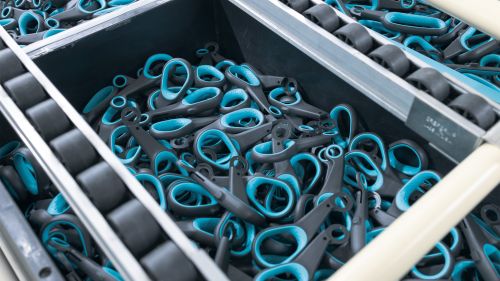
At the GARDENA plant in Niederstotzingen near Ulm, the all-purpose scissors “SchnippSchnapp” are produced.
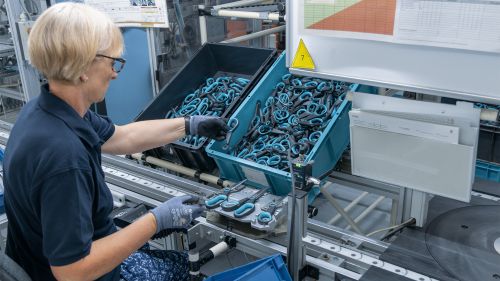
The components are assembled manually. This allows assembly of different types of shears on the same production line.
Semi-automated production
Significant portions of the production process are automated. For example, robots are used to feed the metal sheets to the punching or laser cutting systems. During grinding, robots precisely guide the blades along the grind stone. This ensures consistently high product quality.
However, some tasks are still carried out manually, such as the final assembly step of GARDENA’s all-purpose scissors “SchnippSchnapp”. Here, a small disc spring is manually inserted into a recess in one of the scissor halves. This will later allow the scissors to open and close smoothly. To ensure flawless product quality, the system automatically checks whether the disc spring has been inserted correctly before screwing the parts together.
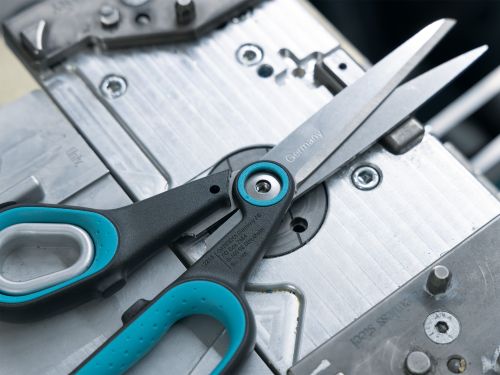
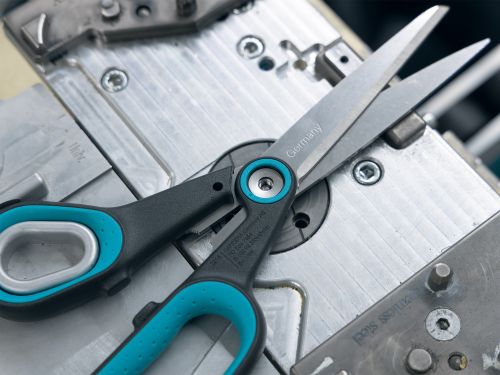
The vision sensor checks whether the disc spring is in the joint and whether it is the right way round (on the left) or the wrong way round (on the right). Rejects due to assembly errors are reliably prevented.
Sven Cermak, tool setter at GARDENA, explains: “Position detection is very special here, because the very small and flat disc spring sits in a recess. Inductive or photoelectric fork sensors would not be useful here. This is why we use ifm’s camera system. It can even detect whether the spring has been inserted the right way round.”
The 2D vision sensor O2D
As inductive or photoelectric fork sensors are not suited for this specific position detection task, the O2D5 vision sensor from ifm is used. This camera-based sensor was specially developed for optical 2D object inspection. It uses blob analysis to compare sets of contiguous pixels, comparing the size, shape and other properties of the disc spring with a programmed target surface.
The ifm parameter setting software Vision Assistant allows easy and quick set-up of the sensor. The user simply defines image zones in which the objects to be detected are located. Using the teach method, a reference image is recorded and then tolerance limits are defined. As soon as these limits are exceeded, the sensor generates an error signal.
The O2D5 device is equipped with an ifm memory stick on which all parameters and settings are stored. If the device needs to be replaced, the stick can be used to easily transfer the data to the new sensor.
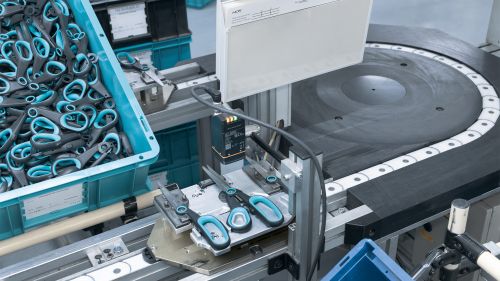
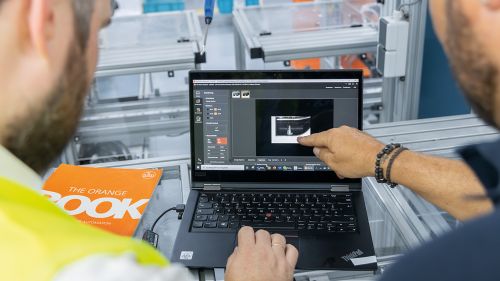
Image 1: The vision sensor checks whether the spring has been inserted the right way round.
Image 2: With the help of the “Vision Assistant” software, the sensor can be easily adjusted to the desired application using the teach function. Fine-tuning is possible thanks to optional parameters.
Extraneous light as a challenge
A particular challenge for camera-based inspection systems are changing light conditions, such as sunlight entering through windows depending on the position of the sun and hitting the objects to be inspected. In such cases, the ifm system proves to be particularly reliable. The trick: during measurement, the system takes five shots at different exposures and automatically uses the image with the optimum exposure for comparison.
Sven Cermak is very pleased with the solution: “On this system, extraneous light does not play a significant role, but we use the same camera on another production line where we have to inspect extremely small parts in the millimetre range. There are large windows there, which means that we have to deal with more pronounced changes in light conditions. Even in this environment, ifm’s camera provides excellent results.” The integrated polarisation filter in front of the camera lens maximizes detection efficiency, allowing highly reflective objects to be detected without any problems.
ifm as a reliable partner
Introducing new technology to an organisation requires comprehensive consultation, as the best solution will only be successful if it fits within the context within which it is being implemented. The partnership of several decades between the renowned garden tool manufacturer GARDENA and the specialist for automation solutions ifm emphasises this cooperation.
Sven Cermak: “We have been working closely with ifm for many years and have developed outstanding solutions together, including the introduction of the camera. Initially, we did not know which systems are available on the market or what is technically feasible. The product experts from ifm advised us expertly, ensuring short and direct lines of communication. We were able to test different camera versions and the collaboration was extremely successful.”
There are many production lines at different GARDENA sites, where production processes are monitored and quality checks are performed. Here too, the vision sensor from ifm proves to be a highly valuable solution.
“We always check whether we can use the camera in other areas as well. We now have three or four cameras in our department. Of course, the cameras are also used extensively by other departments and sites, even more than here,” says Sven Cermak.
Jens Starke is confident about the future: “One big project is still to come, where certain factory standards have to be met. It all centres around sensors, camera technology, scanning and similar topics, so it would be great to work on this project with ifm.”
Conclusion
The vision sensors from ifm prove to be a highly effective solution for production control and quality assurance, in particular for small parts monitoring, where conventional position sensors reach their limits. With its slogan ‘close to you’, ifm not only demonstrates its commitment to hardware, but also its active support and expertise.
Production Manager Jens Starke sums it up this way: “The ifm slogan ‘close to you’ definitely reaches the shop floor.”